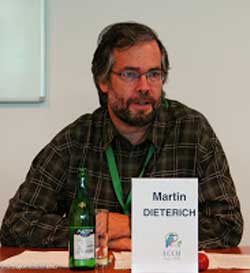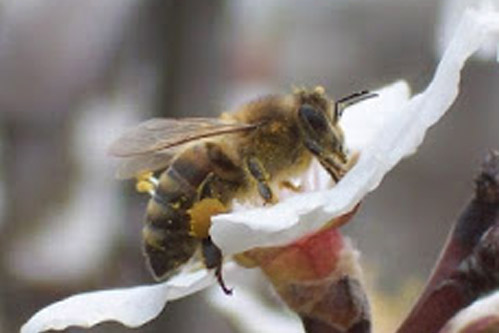The European Commission’s review of the Birds and Habitats Directives under the Regulatory Fitness and Performance Programme (REFIT) is a prominent topic in European nature conservation policy this year. The Society for Conservation Biology Europe Section (SCB-ES), has followed the process closely. Decisions made under this review could have substantial implications for biodiversity conservation across the EU. The Nature Directives provide the cornerstone of EU conservation legislation, protecting all wild birds, over 1000 other rare and endemic species, and over 200 habitat types, whilst also underpinning the Natura 2000 network of protected areas.
 |
|
European Roller (Coracias gamulous). Credit: Bajomi Bálint.
|
SCB-ES recently checked in with member, and former president, Professor Martin Dieterich, to find out more about the ‘Fitness Check’ of the Nature Directives and REFIT processes.* Professor Dieterich is a conservation biologist at the Landscape and Plant Ecology Institute, Agricultural University of Hohenheim (Germany). He has worked extensively on EU protected grassland habitats and species, and has also been involved in Natura 2000 management planning. Prof. Dieterich has been following the ‘Fitness Check’ process closely and recently visited Brussels to take part in the REFIT Conference summarizing the results of the process and providing last minute opportunities for stakeholder involvement.
SCB-ES: Why is the European Union conducting a ‘fitness check’ of the EU Nature Directives?
Dieterich: The Fitness Check of the Nature Directives is part of the EU's REFIT established to assess the suitability of EU regulations in general. It is not specifically targeted at or restricted to the Nature Directives: Fitness checks are conducted to make EU legislation fit for purpose. The Nature Directives were on a list introduced by the new Commission President Jean-Claude Juncker, but why they were selected for the fitness check still remains unclear.
 |
|
Former SCB Europe Section President Martin Dieterich.
|
SCB-ES: Can you summarize the key processes being undertaken in the ‘fitness check’ and tell us what the EU hopes to gain from this process?
Dieterich: In short, the EU hopes to streamline legislation in a quest to reduce bureaucracy. There was a pre-consultation of selected stakeholders across Member States via a questionnaire supported by interviews. The pre-consultation covered a broad array of stakeholders, but as far as I know the science community was not openly engaged in this process. Then, there was a web-based public consultation that yielded a record of more than 550 thousand responses from all over the EU. Finally, the REFIT conference in Brussels provided a venue for the EU to present the outcome from the consultation process and to present
results from commissioned research.
SCB-ES: What led to the discussions about the ‘fitness check’ of Europe’s Nature Directives among conservation professionals at ICCB-ECCB 2015 in Montpellier?
Dieterich: There was concern from conservation scientists, administrations and non-government groups that the fitness check would be used to open and subsequently weaken the directives. In other words, if legal flexibility was added to the directives it could relax the fairly-strict requirements e.g. for impact assessments prior to proposed development projects. Such ‘relaxing’ would strongly undermine the directives. In preparing for the Montpellier symposium, we also noticed that the independent science community was hardly at all represented in working groups linked to the implementation of the directives. Consequently, these discussions and related concerns resulted in the
SCB-ES Policy Committee writing a consensus statement on the need to strengthen the EU legal framework for nature conservation and incorporate scientists and science more actively in the process.
"There was concern from conservation scientists, administrations and non-government groups that the fitness check would be used to open and subsequently weaken the directives. In other words, if legal flexibility was added to the directives it could relax the fairly-strict requirements e.g. for impact assessments prior to proposed development projects. Such ‘relaxing’ would strongly undermine the directives." - Martin Dieterich
|
SCB-ES: What do you believe are key values of the EU Nature Directives that require consideration under the ‘fitness check’?
Dieterich: Ideally, I think, there is a need for more flexibility in terms of the annexes, probably a distinct addressing of areas with no or limited human intervention (e.g. remote mountain areas, nearly pristine forests), because these areas also are a key component of nature conservation in the EU. Otherwise, the directives are a beautiful piece of legislation that in very simple terms combines strict protection with a certain flexibility in terms of application and possibilities for some development to continue even within
Natura 2000 sites, provided there is appropriate environmental compensation assuring continued or improved conservation status of species and habitats concerned. Importantly, the directives shift the burden of proof from conservation to development, meaning that proposed development has to prove there is no harm, rather than conservation having to prove harmful effects from a proposed project.
Unlike similar regulation in other countries or regions, such as the United States’ Endangered Species Act, the directives also link site and species protection, they request overall coherence as a potentially important factor for favorable conservation status and they explicitly point to the need for scientific input with regards to the delineation of protected sites, how the directives are put into effect and how success is determined (monitoring).
 |
|
Credit: Bajomi Bálint
|
SCB-ES: Are there any possible negative outcomes that could result from the ‘fitness check’? If so, what are these?
Dieterich: In my opinion, the key negative outcome would be addition of more legal flexibility in terms of implementation. Such flexibility would subsequently weaken court cases and thus weaken the overall implementation of the directives.
SCB-ES: What do you believe is the best way forward for the EU and the Nature Directives?
Dieterich: In the legal sense, leave the directives as they are. However, the EU ideally needs to find a mechanism to update the Annexes. The Annexes hold the species and habitat types of "community interest", i.e. those species and habitats for which reserves have to be delineated or species that are under strict protection anywhere in the EU territory. In times of climate change, in particular, environments are variable, and many species could become more threatened for various reasons and subsequently warrant protection. It is also clear that some taxa and habitat types remain underrepresented or not represented at all in the directives. Updating the Annexes would allow the directives to have a broader reach and a greater flexibility to ensure adequate representation of species and habitats at greatest risk of further declines and loss.
In the practical sense, there is a need for effective implementation of the EU nature directives and associated policies. Through the Fitness Check, poor implementation has been unanimously identified as a prominent deficiency by diverse stakeholders. I think that effective implementation of the directives calls for more scientific involvement. The science community will have to pose themselves the question on how they want to address this need for more application targeted research in ecology and conservation science, rather than continuing a quest for general principles that in a field of science relating to context bound implementation often do not exist. Conservation biology urgently needs more science that is fit for application.
This article originally appeared on the SCB Europe Section Blog. The Section thanks Prof. Dieterich for his time on this interview and for his commitment to improving our understanding of the European Union 'Fitness Check'. Follow @SCBEurope on Twitter and like the Secton on Facebook to stay current with Section initiatives and opportunities to get involved. If you have questions or comments about this post, or any of our other projects/initiatives, please contact us on Twitter, Facebook or email us at europe (at) conbio (dot) org.
Author Bio
Stephanie Januchowski-Hartley serves on the SCB Europe Section board of governors and is president of the SCB Freshwater Working Group. Follow her on Twitter @ConnectedWaters.



